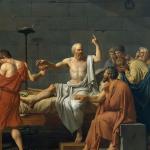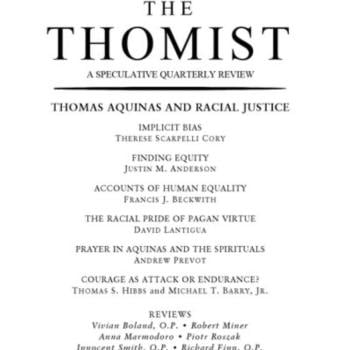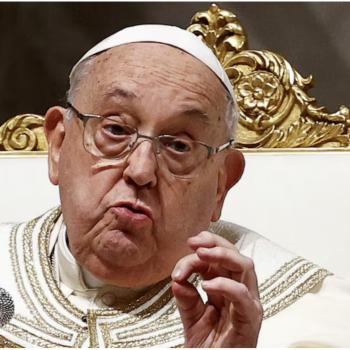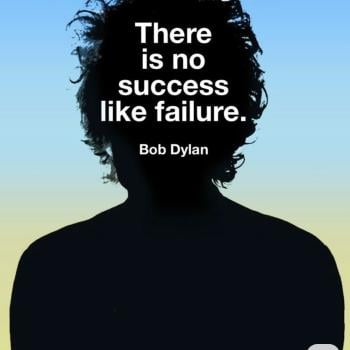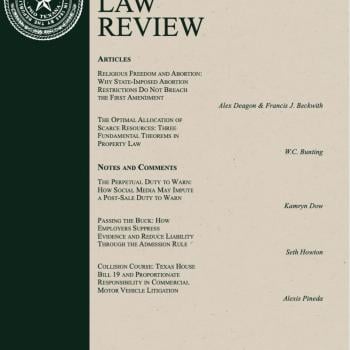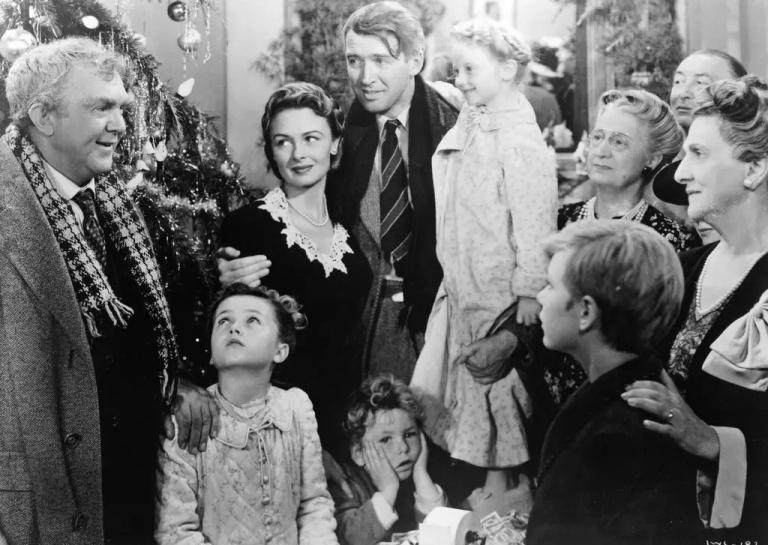 I am happy to be contributing a chapter to a forthcoming book on faith and film, edited by political scientists Carson Holloway (University of Nebraska, Omaha) and Micah Watson (Calvin University). Entitled “God, Man, and George Bailey: The Theological Anthropology of It’s a Wonderful Life,” my chapter begins with this paragraph:
I am happy to be contributing a chapter to a forthcoming book on faith and film, edited by political scientists Carson Holloway (University of Nebraska, Omaha) and Micah Watson (Calvin University). Entitled “God, Man, and George Bailey: The Theological Anthropology of It’s a Wonderful Life,” my chapter begins with this paragraph:
It’s a Wonderful Life is one of the most well-known and most-watched films in the history of American cinema. Although often labeled a Christmas movie, it is far more than that. Its lessons about life, virtue, and faith—which are never out of season—are central to the film’s character and have made a lasting impression on audiences for several generations. In this chapter, I explore those lessons and, when necessary, respond to critics who seem to misunderstand or mischaracterize them. My interpretation of the film differs from both the judgment of its first reviewers, who depicted it as simplistic and too sentimental, as well as recent criticisms from political theorist Patrick Deenen and certain feminist writers, who argue that the picture self-defeatingly advances the cause of modern liberalism (Deneen) or diminishes the status of women’s choices (feminist critics). Contra these critiques, I argue that It’s a Wonderful Life is pointedly realistic about human nature, that it captures both the grandeur and the darkness of the human condition including the joys and disappointments that we experience as a consequence of our dependency and the moral duties we do not choose.
Here are some other excerpts from the chapter (footnotes removed):
Notre Dame political theorist Patrick J. Deneen argues that the main problem with It’s a Wonderful Life is its implicit promotion of free market sensibilities. Where the FBI saw a Communist plot, Deneen sees a capitalist coup. According to Deneen, free market philosophy–combined with its advocates’ ambitions to create wealth, expand economic opportunities, secure individual choice, and increase social mobility—has the corrosive effect of dissolving the social structures, close-nit relationships, and civic bonds of small town American life that the film’s chief protagonist, George Bailey (played by Jimmy Stewart), ultimately discovers are the source of his happiness. Deneen writes: “George represents the vision of post-war America: the ambition to alter the landscape so as to accommodate modern life, to uproot nature and replace it with monuments of human accomplishment, to re-engineer life for mobility and swiftness, one unencumbered by permanence, one no longer limited to a moderate and comprehensible human scale.” For Deneen, home ownership in planned communities, geographically detached from the charm and closeness of downtown dwellings and mom and pop businesses, was the death knell of the Front Porch Republic that once made America great. Yet it was the Europe that was teeming with its old world enchantments, piazzas, beautiful cathedrals, idyllic shops and eateries, inherited monarchies, clusters of dense neighborhoods, and its encumbered permanence that required U.S. soldiers like Harry Bailey, George’s kid brother (played by Todd Karns), to risk their lives to save the continent from self-destruction twice in the 20th century. Deneen, to be sure, is not entirely wrong in arguing that human happiness, contrary to what has been promised by certain strands of modern thought, does not lie in the individual’s power to extricate himself from the unchosen givens of his own existence—nation, heritage, home, and faith. But, as I suggest below, It’s a Wonderful Life aligns well with this critique, precisely because of what is revealed to George about the meaning of his own life and what makes life worth living. Whether modern subdivisions like Bailey Park are the primary cause of the contemporary unraveling of trust and communal bonds, as Deneen argues, is a question outside the scope of this chapter, though one should be suspicious of such “just so stories” when one can easily summon a counterexample….
George demands to know from Clarence the fate of the Pottersville Mary. Although initially reluctant to reveal anything, Clarence tells George that Mary is a never-wed librarian. This scene has not gone unnoticed by feminist critics of the film, one of whom [Emily Scot] writes: “In the dystopian, George Bailey-less, worst-case-scenario version of Bedford Falls, can you guess what horrific fate befalls Mary? She’s a librarian, and she’s single. That’s the worst possible thing that could happen to her, apparently. How would she have ever survived without George to save her from spinsterism?!” But the film is actually communicating just the opposite: Mary saved George from a life of rootless adventurism. Her love anchored him in Bedford Falls, where he was able to cultivate virtues that would have eluded him if he had become the harem-forming globe-trotting explorer envisioned by his twelve-year-old self. Without Mary’s influence at decisive moments in George’s life, the Building & Loan would have eventually failed. It was Mary who saw in George undeveloped qualities that lay dormant beneath his egoistic, though well-meaning, ambitions; it was her idea to use their honeymoon money to mollify the anxious account holders when there was a run on the bank; and, as we shall see below, it was her ingenuity and leadership that saved her husband from scandal and prison. Feminist theory obscures rather than illuminates the lesson we ought to learn from the fates of George and Mary in either timeline: the Pottersville Mary is not better off without George, and the Bedford Falls George is not better off without Mary. This means that if Clarence had transported Mary to an alternative universe in which she had never existed, she likely would have been horrified to discover an unmarried and childless playboy George unencumbered by nation, heritage, home, or faith. In other words, without Mary, George could have wound up being a middle class Hugh Hefner, which in the pecking order of lives well lived is not even in the same moral universe as spinster librarian.
You can read a draft of my chapter over at my SSRN page. If you have any suggestions, please do not hesitate to write them in the comments below or private message me.



